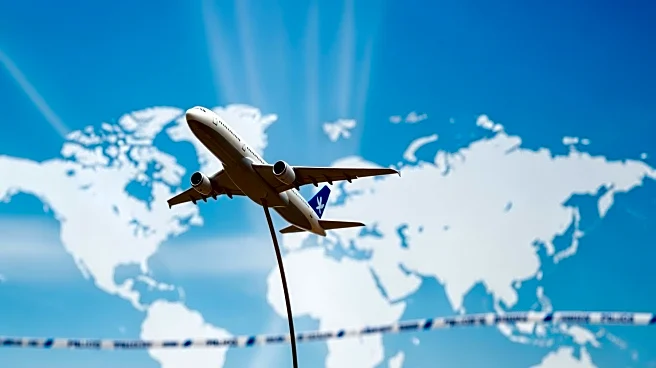What's Happening?
Pakistan International Airlines (PIA) has resumed flights to the United Kingdom after a five-year hiatus. The ban, initially imposed in June 2020, followed a deadly crash in Karachi and revelations of
pilots holding fake licenses. The European Union lifted its ban in November 2024 after extensive safety audits, allowing PIA to restore its routes. The first flight, a Boeing 777, departed from Islamabad to Manchester, marking a significant milestone for the airline. Pakistan's Defense Minister, Khawaja Mohammad Asif, emphasized the importance of these flights for the 1.4 million Pakistanis residing in Britain and Europe, highlighting the economic benefits and the moral duty to provide direct air links.
Why It's Important?
The resumption of flights is crucial for strengthening economic and cultural ties between Pakistan and the UK. It is expected to generate substantial revenue, boost trade and tourism, and facilitate the movement of people and goods. For the Pakistani diaspora in the UK, these flights offer a direct connection to their homeland, potentially increasing remittances, which are vital to Pakistan's economy. The move also reflects improved safety standards in Pakistan's aviation sector, restoring international confidence and opening doors for further international collaborations.
What's Next?
PIA plans to expand its services to include flights to London and Birmingham, further enhancing connectivity. The airline's successful return could encourage other international carriers to consider similar routes, potentially increasing competition and lowering fares. Stakeholders, including the Pakistani government and the diaspora, are likely to monitor the airline's performance closely, ensuring that safety and service standards are maintained.
Beyond the Headlines
The resumption of flights may have broader implications for Pakistan's aviation industry, potentially attracting foreign investment and partnerships. It also underscores the importance of regulatory compliance and transparency in rebuilding trust with international partners. The move could serve as a case study for other countries facing similar challenges in their aviation sectors.









